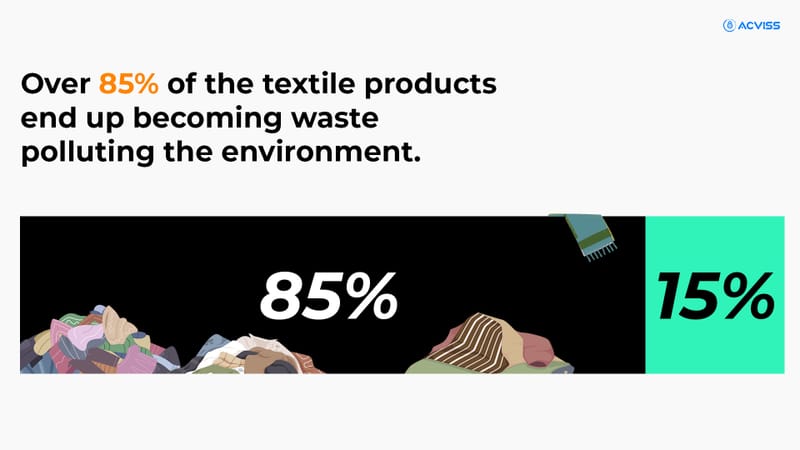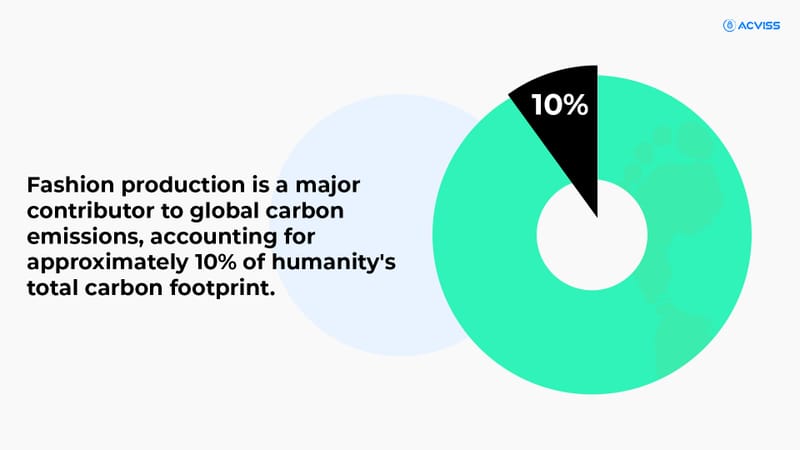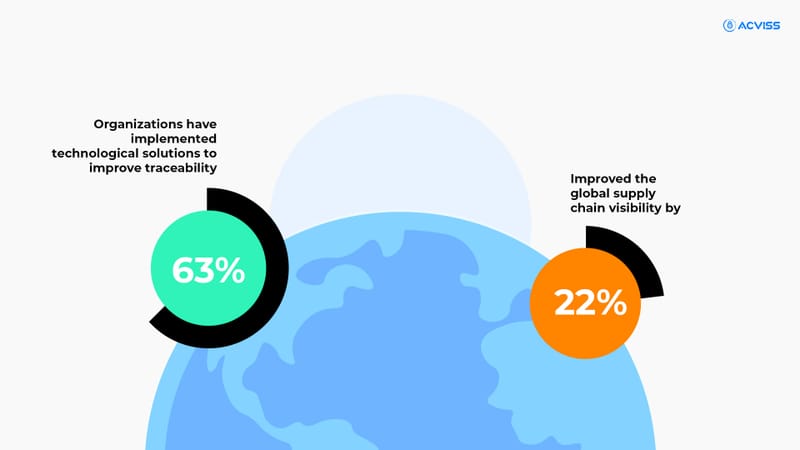Why Fashion Industry Invests in Traceability to be Sustainable

The fashion industry, once shrouded in secrecy, is undergoing a revolution towards transparency. Consumers are increasingly demanding ethical and sustainable practices, seeking to understand where their products come from.
Think about a world where your favourite silk blouse paints its origin story - the mulberry farm in China, the skilled weaver in India, the ethical dye house in Italy. This transparency, once unimaginable, is becoming a reality thanks to the growing importance of supply chain traceability in the fashion industry.
Contents
- What is Traceability in Supply Chain
- The Importance of Traceability in the Fashion Industry
- Global Champions Weaving a Transparent Future
- A. The Ellen MacArthur Foundation
- B. Sustainable Apparel Coalition (SAC)
- C. Global Fashion Agenda
- D. Fashion Revolution
- E. The Ethical Fashion Initiative
- Innovative Solutions for Fashion Traceability
- The Ripple Effect of Traceability
- Challenges and the Path Forward
- A Sustainable Future with Traceability
What is Traceability in Supply Chain
Traceability refers to the ability to track a product's journey from its origin to the final consumer, providing transparency and accountability throughout the supply chain. Over 63% of organizations have implemented technological solutions to improve traceability in their supply chain, this has raised the global supply chain visibility by 22%.
Tracing the origins of materials and manufacturing processes, allows brands to identify and address issues of various vulnerabilities in their supply chain and calculate threats to their operations. Moreover, product traceability enables consumers to make informed choices about the products they purchase, supporting brands that prioritize ethical and sustainable practices.
The Importance of Traceability in the Fashion Industry
The fashion industry, while glamorous on the surface, often grapples with hidden complexities. Concerns about unethical labour practices, environmental damage and material misrepresentation plague its long, global supply chains.
1. Ethical Labor Practices:
Exploitative labour practices, including child labour, unsafe working conditions and minimal wages, are prevalent in many garment factories worldwide. Without traceability, brands may unknowingly source materials from suppliers that engage in these unethical practices. By shedding light on the origins of materials and the labour conditions involved in their production, product traceability enables brands and consumers to make more ethical choices.
2. Environmental Impact:
Fashion production is notorious for its environmental footprint, with processes such as textile dyeing, chemical treatments, and garment manufacturing contributing to pollution and resource depletion. Due to the low durability over 85% of the textile products end up becoming waste polluting the environment. Traceability allows brands to track the impact of their supply chains, from raw material extraction to product disposal. Identifying areas of high environmental impact and implementing sustainable practices like using organic or recycled materials and reducing energy consumption.
Must Read: 10 Key Points About EUDR Deforestation Regulation

3. Material Misrepresentation:
Greenwashing and false claims of sustainability are rampant. 73% of millennials are ready to pay more for sustainable products. Leading many brands to tout their products as "eco-friendly" or "sustainable" without providing concrete evidence to support these claims. Traceability enables brands to verify the authenticity of their sustainability claims by providing transparent information about the materials used in their products, including their origin, production methods and environmental footprint.
4. Carbon Footprint of Fashion Production:
Fashion production is a major contributor to global carbon emissions, accounting for approximately 10% of humanity's total carbon footprint. From the cultivation of raw materials to manufacturing, transportation and distribution, every stage of the fashion supply chain requires energy and emits greenhouse gasses. Traceability helps to track and reduce their carbon footprint, from sourcing sustainable materials to optimizing transportation routes and reducing waste.
Learn how to authenticate your purchases!
Global Champions Weaving a Transparent Future
As awareness grows about the need for transparency in fashion supply chains, global organizations are stepping up to support traceability initiatives.
A. The Ellen MacArthur Foundation
The Ellen MacArthur Foundation launched in 2010, focuses on the transition to a circular economy, where resources are used more efficiently and waste is minimized. Through initiatives like the Make Fashion Circular platform, the foundation encourages brands to adopt circular economy principles and prioritize traceability in their supply chains.
B. Sustainable Apparel Coalition (SAC)
The Sustainable Apparel Coalition (SAC) is a coalition of over 300 brands, retailers, manufacturers and NGOs committed to reducing the environmental and social impacts of the apparel and footwear industry. One of SAC's key initiatives is the Higg Index, a comprehensive tool that measures the environmental and social performance of apparel and footwear products throughout their lifecycle.
C. Global Fashion Agenda
Global Fashion Agenda is a nonprofit organization that convenes industry leaders and stakeholders to drive positive change in the fashion industry. The organization advocates for mandatory traceability regulations, ensuring that brands are held accountable for their supply chains.
D. Fashion Revolution
Fashion Revolution is a global movement dedicated to promoting transparency, sustainability and ethics in the fashion industry. Founded in 2013 by Carry Somers and Orsola de Castro, the organization has grown into a global network with teams in over 100 countries.
E. The Ethical Fashion Initiative
The Ethical Fashion Initiative (EFI) is a flagship program launched in 2009 by the International Trade Centre (ITC), a joint agency of the United Nations and the World Trade Organization (WTO). Its mission is to promote sustainable and inclusive development in emerging economies through increased trade and employment in the creative and cultural industries, specifically focusing on fashion and textiles.

Innovative Solutions for Fashion Traceability
The fashion industry is grappling with the demand for transparency, and innovative technologies are rising to the challenge.
1. Blockchain Technology
Blockchain technology makes this possible. It creates a tamper-proof ledger that tracks and maintains a digital record of every step a garment takes. Solutions like Origin by Acviss powered by Blockchain track products from raw material sourcing and production to distribution and retail, giving brands and consumers a detailed story of a product's journey.
- Secure Tracking: Each transaction is etched onto the blockchain, providing a transparent and tamper-proof record of the product’s journey.
- Authenticity: With each step recorded, blockchain empowers brands to verify product authenticity and combat counterfeiting. Brands equipped with Origin allow consumers to scan Acviss QR labels by using the dedicated app to confirm a garment's genuine source.
- Transparency at your fingertips: Consumers gain access to a product's story through QR codes or apps. This transparency builds trust and empowers informed choices.
2. RFID Tags
Radio Frequency Identification (RFID) tags embedded in clothing make real-time tracking of products a reality. Brands can scan these tags to gain deep visibility into product movement. Fashion giant ZARA has implemented RFID tags to fasten their inventory counting process and make it efficient.
- Individual Item Tracking: Each garment equipped with an RFID tag becomes traceable, offering detailed insights into its journey from production to sale.
- Supply Chain Optimization: Real-time tracking empowers brands to monitor inventory levels, optimize logistics and streamline their supply chains.
- Enhanced Accountability: By scanning RFID tags, brands can trace material origins, verify product authenticity and ensure compliance with ethical and sustainability standards, fostering greater accountability.
3. NFC Tags
Getting instant information about a garment simply by tapping your phone is a convenience anyone dreams about. Near Field Communication (NFC) tags make this possible. Attached to clothing, these tags offer consumers a wealth of product details with a simple tap.
- Instant Information: Consumers gain immediate access to a garment's origin, materials, and production methods by tapping their smartphones on NFC-enabled products.
- Empowered Choices: Armed with transparent information, consumers can make informed decisions and support brands that prioritize ethical and sustainable practices.
- Beyond the Label: NFC tags go beyond traditional labels, providing details like sustainability credentials and care instructions, enhancing the shopping experience.

The Ripple Effect of Traceability
Traceability is having a transformative impact on the fashion industry, creating a ripple effect that empowers consumers, enhances brand accountability, and fosters a more sustainable future.
- Empowering Consumers to Make Informed Choices:
By shedding light on a product's journey, from origin to finished garment, traceability equips consumers with the knowledge to make informed purchasing decisions. This transparency allows them to support brands aligned with their values, prioritizing ethical and sustainable practices. 69% readers of Vogue have stated that they prefer sustainable products when it comes to the fashion industry. This shift in consumer demand, in turn, incentivizes brands to embrace ethical and sustainable production, driving positive change throughout the industry.
- Enhancing Brand Accountability and Ethical Sourcing:
Traceability provides insight into a brand's supply chain practices, holding them accountable for the materials they source and the conditions under which their products are made. Sales of products marked as sustainable are estimated to grow 5 times more than other products. This increased transparency incentivizes brands to adopt ethical and sustainable practices throughout their supply chains, minimizing their environmental footprint and improving their social impact.
- Combating Counterfeiting and Ensuring Authenticity:
It is a powerful tool to prevent unauthorized intervention and tampering and combat counterfeiting, protecting both brands and consumers. Providing a transparent record of a product's journey, complete with verification of its origin, materials and production methods, traceability assures consumers of the product's authenticity and quality.
- Optimizing Supply Chains and Minimizing Waste:
The insights into the movement of products and materials throughout the supply chain enable brands to identify inefficiencies and optimize logistics. This leads to reduced waste, minimized environmental impact and improved overall efficiency. Real-time tracking capabilities further empower brands to optimize transportation routes, reducing shipping costs and streamlining their operations.
Learn how fast fashion is creating a global disaster
Challenges and the Path Forward
- Cost Barriers: Implementing the technology, from hardware to training, can be expensive, especially for smaller brands. Collaboration and financial incentives are crucial to bridge this gap.
- Complex Supply Chains: Integrating across fragmented ecosystems requires collaboration among stakeholders, from brands to manufacturers. Standardized data formats are also essential for seamless information exchange and avoiding inefficiencies.
- Regulatory Landscape: Governments can play a key role with regulations and incentives, but varying frameworks across different markets pose challenges. The recent initiative from the European Union to mandate DPP (Digital Product Passport) is a significant step in the traceability field, but other economies adopting the same remains a question to be answered. Brands need standardized data and compliance support to steer through this tricky landscape.
Remember, not every solution will be suitable for every brand, you must choose one that meets the requirements. Solutions like Origin are highly customisable and seamlessly integrate with the existing supply chain to ensure a smooth transition, guaranteed with a user-friendly approach providing less reliance on the manpower training process.
A Sustainable Future with Product Traceability
Traceability is not just a buzzword; it's a transformative force rewriting the fashion narrative. As the initiative gets more and more backing from the industry giants, we inch closer to a future where every garment reveals a story of ethical sourcing, environmental responsibility and empowered consumers. This is not a fairy-tale ending, but a new chapter in fashion's journey towards sustainability, woven with the thread of transparency.
Join us in advocating for a more transparent and sustainable fashion industry. Head over to Acviss to learn more or get in touch with us to understand how we can get your supply chain secured.
